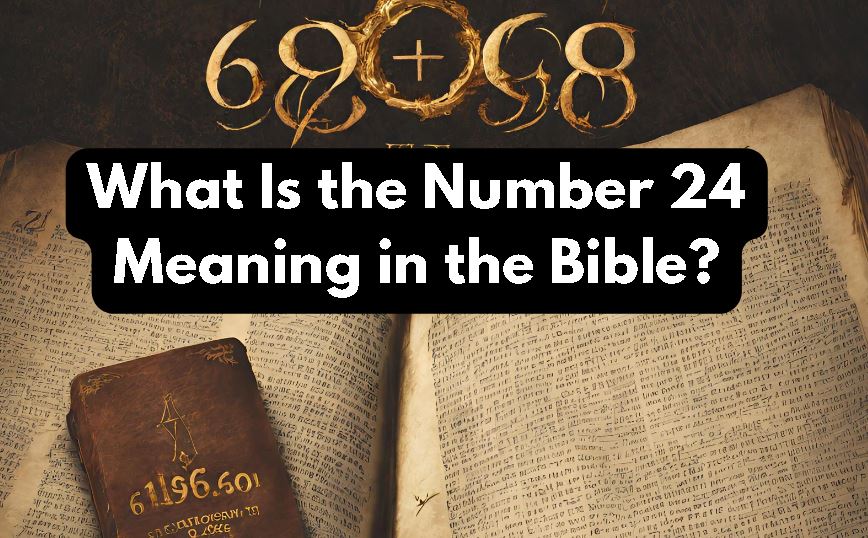The number 24 appears several times in the Bible, both in the Old and New Testaments. But what does this number actually represent? Upon closer examination, we find that the number 24 consistently symbolizes priesthood, worship, service, and praise in Scripture.
Table of Contents
The 24 Divisions of Priests
One of the most prominent connections between 24 and priestly duty comes from 1 Chronicles 24. This chapter describes how King David organized the priests, who were descendants of Aaron, into 24 divisions. He appointed leaders for each division, and the divisions took turns performing priestly duties in the temple.
Specifically, we read:
“Behold, I have organized the divisions of the priests for the service…These had as their appointed duty…to minister in the house of the Lord” (1 Chronicles 24:3, 19).
So right away we see that number used in connection with priestly responsibility and temple service. The 24 divisions allowed the priests to fulfill their obligations while still having time off. This organization system was quite practical.
The 24 Heavenly Elders Around God’s Throne
The book of Revelation provides another important link between 24 and worship. When John experiences a heavenly vision of God’s throne room, he sees 24 elders sitting on thrones and worshipping God:
“Around the throne were twenty-four thrones, and seated on the thrones were twenty-four elders, clothed in white garments…and they cast their crowns before the throne, saying “Worthy are you, our Lord and God” (Revelation 4:4, 10-11).
These 24 elders likely represent the 12 tribes of Israel and the 12 apostles, showing how both groups participate in heavenly worship. Their thrones and crowns denote places of honor and responsibility. So in this example, 24 is connected to eternal praise of God.
The 24 Refrains of “His Steadfast Love Endures Forever”
We also find a clear connection between 24 and worship through music in Psalm 136. This psalm recounts God’s mighty acts in history, specifically how He delivered Israel from enemies. The end of every verse contains the phrase “His steadfast love endures forever.”
Remarkably, this refrain is repeated 24 times throughout the psalm. The number seems to represent a song of praise to God at all times and through all circumstances. Since there are 24 hours in a day, it has been said that the psalm’s structure honours God in every single hour.
Jesus’ Reference to 24 Hours in a Day
In fact, Jesus Himself established a link between 24 and the hours of the day, specifically in terms of work and production. For example:
“Are there not twelve hours in the day? If anyone walks in the day, he does not stumble” (John 11:9).
“The day laborers worked one hour and got one day’s pay, just like you. But these people work only one short hour and you make them equal to us?” (Matthew 20:12).
So in both these examples, Jesus uses the number 12 to represent half of a 24 hour cycle. This demonstrates how Jewish culture viewed a standard day containing 24 distinct segments.
Additional Symbolic Connections
Beyond these primary links to priesthood and praise, we find the number 24 appearing in several other forms:
- In the inner chambers of the temple built by Solomon, there were 24 utensils made of gold (1 Chronicles 28:14-16)
- The dimensions of the new Jerusalem described Revelation are laid out in multiples of 12 that equal 24 measures (Revelation 21:16-17)
- Jewish rabbis identified 24 books as canonical in the Hebrew Bible
So while not one of the “perfect” numbers like 7, 12, and 40, the number 24 maintains special symbolism in Scripture tied to responsibility, worship, service, and the hours of the standard day.
Modern Significance and Application
Even today, we see significance found in the 24 priestly divisions and hours of heavenly praise represented by the number 24. Consider the following modern connections:
- Many churches organize worship teams, prayer groups, and Bible study leaders into 24 hour rotations
- Popular worship songs feature repeated verses or choruses 24 times
- Youth conferences and revival meetings often feature 24 hours of continual praise
- Believers are encouraged to adopt a lifestyle of praise through all 24 hours
The constant refrain found in Psalm 136 – “His steadfast love endures forever” – should serve as a mantra for Christians in every daily hour. Just as the priests served in the temple 24 hours a day through the division system, we too are called to lives of perpetual service and willingness to pray and praise God at any time.
So in summary, while not highlighted to the extent of other numbers like 7 and 40, the number 24 maintains important symbolism throughout both the Old and New Testaments related to priesthood, heavenly worship, the hours of the day, and living in continual devotion.
Conclusion: The Number 24
In analyzing the Scriptural evidence, 24 clearly connects to organization of priestly responsibility, heavenly worship, and the hourly segments of the day. Whether seen in the 24 divisions of priests in 1 Chronicles, the 24 elders surrounding God’s throne in Revelation, or Jesus’ references to a 24 hour day, we find great significance.
Modern believers should be encouraged and challenged to adopt lifestyles and routines of praise modeled by these priestly divisions and daily praise reflected by the number 24. Just as a day contains 24 hours, our weeks should contain daily times focused on prayer, Scripture reading, and worship – “His steadfast love endures forever.





